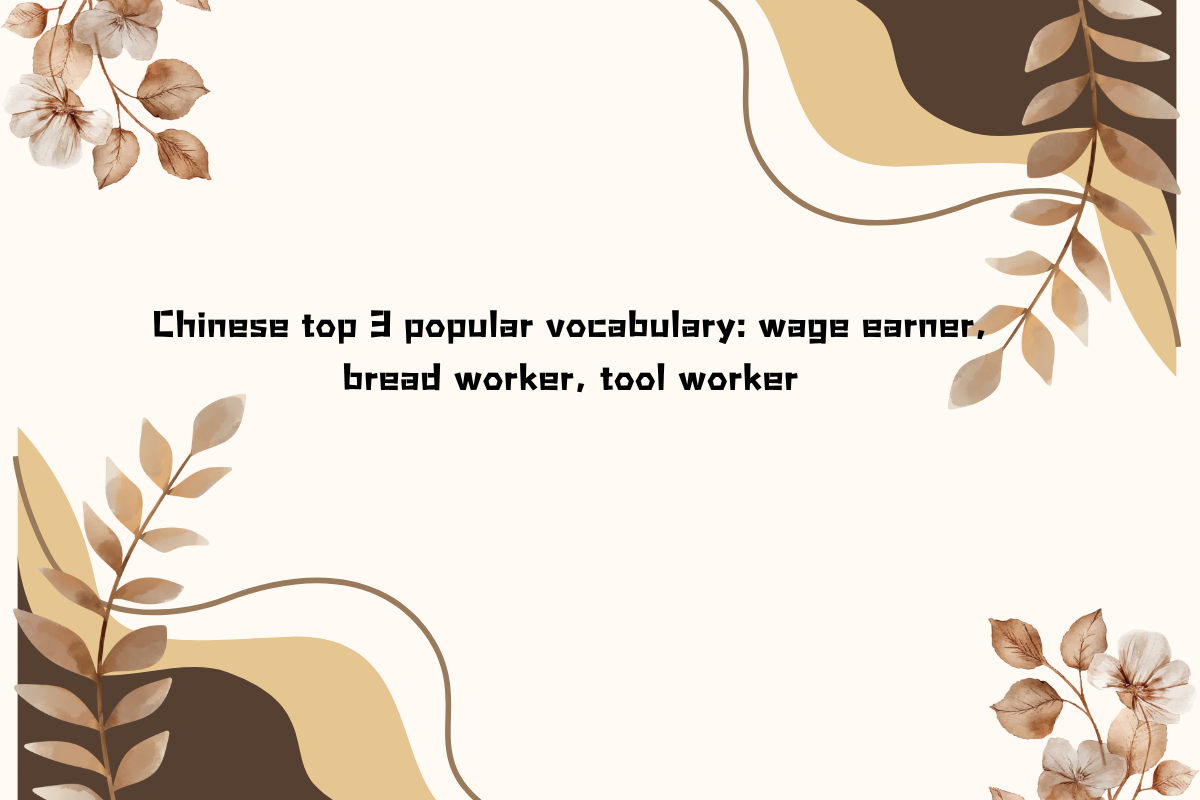Chinese Top 3 Popular Vocabulary for Job Types
In recent years, Chinese internet culture has given rise to a plethora of colorful terminologies that encapsulate various aspects of modern life. Among these, three terms have gained significant popularity人气 (rén qì) and become emblematic of certain societal roles and attitudes. Let's delve into the fascinating world of "wage earner," "bread worker," and "tool worker."

人气 (rén qì), noun, popularity
Examples:
- Her singing talent contributed to her rising popularity among fans.
她的歌唱才华增加了她在粉丝中的人气。
tā de gēchàng cáihuá zēngjiāle tā zài fěnsī zhōng de rénqì. - The movie gained popularity quickly after its release.
这部电影在上映后迅速赢得了人气。
zhè bù diànyǐng zài shàng yìnghòu xùnsù yíngdéle rénqì.
Wage Earner (打工人)
The term "打工人" (dǎ gōng rén) refers to individuals who engage in labor-intensive work typically for a fixed wage or salary. These individuals form the backbone of many industries, from manufacturing to service sectors. The term has gained traction due to its representation of the challenges faced by ordinary working-class people striving to make ends meet. In a society 社会 (shè huì) where economic disparity is increasingly evident, "wage earners" symbolize perseverance, hard work, and resilience in the face of adversity.
社会 (shè huì), noun, society
Examples:
- The society is changing rapidly.
社会在迅速变化着。
shè huì zài xùn sù biàn huà zhe. - We all have a role to play in shaping society.
我们每个人都有责任来塑造社会。
wǒ men měi gè rén dōu yǒu zé rèn lái sù zào shè huì.

Bread Worker (干饭人)
In the fast-paced and competitive landscape of modern China, the concept of "干饭人" (gàn fàn rén), or "bread workers," has emerged as a reflection of the relentless pursuit of sustenance and survival. These individuals are characterized by their unwavering dedication to their work, often expressed humorously as simply "干饭" (gàn fàn), which translates to "eating rice" or "having a meal." Beyond its literal meaning, "bread worker" embodies the notion of striving for stability and security in a society marked by rapid change and uncertainty.

Tool Worker (工具人)
The term "工具人" (gōng jù rén), or "tool worker," has gained popularity in the realm of interpersonal relationships, particularly in the context of romantic entanglements. It refers to individuals who are perceived as disposable or instrumental, often used by others for their own benefit without genuine regard for their feelings or well-being. While initially used humorously, "tool worker" sheds light on the complexities of modern relationships and the challenges of navigating interpersonal dynamics in a digital age.
Key Sentences:
- I am a wage earner.
我是一个打工人。
Wǒ shì yīgè dǎgōngrén. - My sister says she's a bread worker.
我姐姐说自己是一个干饭人。
Wǒ jiějiě shuō zìjǐ shì yīgè gànfànrén. - He always asks me for help, I feel like a tool worker!
他一直找我帮忙,我觉得自己是一个工具人!
Tā yīzhí zhǎo wǒ bāngmáng, wǒ juédé zìjǐ shì yīgè gōngjùrén!